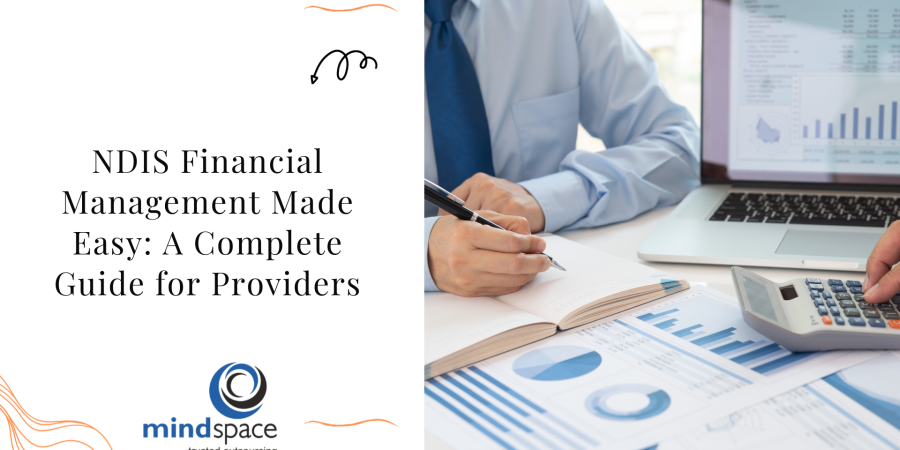NDIS Financial Management Made Easy: A Complete Guide for Providers
As the National Disability Insurance Scheme (NDIS) continues to evolve and grow across Australia, so do the responsibilities of NDIS providers. Whether you’re just starting out or are a seasoned support provider, managing the financial side of the NDIS can feel complex.
From submitting claims via the NDIS portal to handling payroll, ensuring ATO compliance, and preparing for audits, effective NDIS financial management is key to sustainability and success. This guide breaks down the core areas of NDIS accounting, helping providers gain financial clarity, stay compliant, and focus on delivering quality care.
What Is NDIS Financial Management?NDIS financial management
NDIS financial management refers to the accounting and administrative processes that help providers manage the funds they receive for delivering services under the NDIS.
It includes:
-
Invoicing and submitting claims through the NDIS portal
-
Managing participant budgets and service agreements
-
Payroll processing and contractor payments
-
Bookkeeping, compliance, and financial reporting
-
Audit preparation and long-term financial planning
These functions can be handled in-house or outsourced to experienced NDIS financial service providers.
💡 Why Financial Management Is Crucial for NDIS Providers
Good financial management is more than balancing books. It helps you:
✅ Ensure Positive Cash Flow
Timely invoicing and efficient claims reduce delays in payments, ensuring your operations run smoothly.
✅ Stay Compliant
The NDIS Quality and Safeguards Commission requires providers to maintain detailed records and undergo periodic audits. Mistakes in recordkeeping can lead to penalties or deregistration.
✅ Plan for Growth
Understanding your NDIS pricing, costs, and margins helps set sustainable pricing, forecast income, and plan service expansions.
Without structured financial practices, providers risk delayed payments, audit failures, and cash flow gaps.
⚠️ Common Financial Challenges Faced by NDIS Providers
NDIS providers operate in a unique financial environment. Here are the key challenges:
-
Complex Claims Process: Claims must align with NDIS item numbers and documentation. Small errors can lead to rejections or delays.
-
Budget Coordination with Participants: Providers must help participants manage funds while avoiding overspending.
-
NDIS and ATO Compliance: Providers must meet strict guidelines for financial reporting, GST handling, and audit readiness.
-
Time Constraints: Small providers often lack dedicated finance teams, making it difficult to juggle admin with client care.
Building Blocks of Effective NDIS Financial Management
1️⃣ Implement a Robust Accounting System
Use cloud-based platforms like Xero, MYOB, or NDIS-specific tools such as CareMaster or Brevity. Your system should:
-
Track income by participant and service type
-
Integrate with payroll and rostering systems
-
Automate invoices and streamline NDIS claim submissions
-
Be accessible remotely for real-time updates
2️⃣ Stay Updated on the NDIS Price Guide
The NDIS Pricing Arrangements and Price Limits document outlines maximum allowable rates. Providers must:
-
Align services with current pricing guidelines
-
Use correct item codes
-
Understand GST exemptions for eligible services
This helps prevent overcharging, underbilling, and compliance risks.
3️⃣ Keep Accurate and Timely Bookkeeping
Regular bookkeeping is critical for NDIS compliance and cash flow visibility. Your records should:
-
Reconcile NDIS payments and commercial expenses
-
Track payroll, rent, vehicles, and other overheads
-
Match bank transactions and payment receipts
-
Maintain clear AR/AP reports
Accurate books enable smooth audits, tax returns, and funding applications.
4️⃣ Budget and Forecast Strategically
Use financial forecasting tools to anticipate income and expenses:
-
Base revenue on active service agreements
-
Estimate payroll and operating costs
-
Plan for overheads like office space, insurance, and admin
-
Monitor cash flow gaps and funding needs proactively
5️⃣ Streamline Payroll and Superannuation
Whether employing staff or contracting workers, ensure you:
-
Comply with award rates, overtime, and leave entitlements
-
Meet ATO and Fair Work reporting requirements
-
Track superannuation and tax contributions
-
Automate payroll using integrated systems
Proper payroll processes prevent legal complications and ensure staff satisfaction.
6️⃣ Be Audit-Ready Year-Round
NDIS audits can be routine or triggered. Stay ready by:
-
Filing all receipts, invoices, and bank records
-
Storing service agreements and participant fund allocations
-
Regularly generating P&L and cash flow reports
-
Keeping detailed logs of income, expenses, and claims
Audit preparation builds trust with the NDIA, participants, and future partners.
Should You Outsource NDIS Financial Management?
Many NDIS providers now outsource their bookkeeping, payroll, and NDIS compliance to specialist firms. Benefits include:
-
Access to NDIS-experienced accountants
-
Lower risk of penalties or payment rejections
-
More time to focus on participant care
-
Scalable services as your business grows
Outsourcing can be partial (e.g., just bookkeeping) or full-service (e.g., including virtual CFO advisory).
How to Choose the Right Financial Partner
When selecting an NDIS accounting partner, look for:
-
Proven experience with NDIS providers
-
Familiarity with the NDIS portal and item codes
-
Transparent, fixed-fee, or flexible pricing
-
Proven compliance and audit success
-
Regular reporting and responsive communication
The right partner becomes part of your growth team, not just your bookkeeper.
Final Thoughts: Clarity = Capacity
In the NDIS sector, financial clarity is essential for delivering quality care and achieving long-term stability. With demand for disability services rising and compliance requirements tightening, every provider should adopt strong financial systems and consider expert support.
Whether you’re running a sole practitioner service or a growing multi-site organisation, structured financial management helps you:
-
Serve more participants
-
Reduce financial risks
-
Scale confidently
-
Stay compliant and audit-ready
With the right tools, expert help, and clear strategy, NDIS financial management can be made easy.


